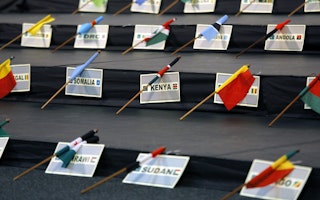In the Run-Up to Elections, Court Declares Burundi’s Press Gag Law Undemocratic
By Peter Noorlander
On May 15, the East African Court of Justice ruled that large parts of Burundi’s Press Law, which was enacted in 2013 to restrict critical reporting in the run-up to the 2015 elections, violate fundamental principles of democracy and the rule of law.
This was the first time that this court, which oversees the entire East African Community of States (which comprises Kenya, Uganda, Burundi, Rwanda, and Tanzania) considered a press freedom case. The judgment marks a significant step forward for media freedom across the region, paves the way for stronger independent reporting in Burundi, and, perhaps more importantly, lays down a marker for press freedom and media regulation in other states in East Africa.
The case was brought by the Burundi Journalists’ Union, represented by the Media Legal Defence Initiative, to challenge the regime of media regulation imposed under Burundi’s 2013 Press Law. The Press Law was enacted specifically to constrain independent media reporting around the elections and, at the time of enactment, received widespread criticism from journalists, human rights organizations, and the international community. UN Secretary General Ban Ki-moon expressed regret over the law, and press freedom and human rights organizations labelled it a grave threat to freedom of expression.
Of particular concern was that the Press Law would impose a compulsory accreditation regime for all journalists, that it would restrict what could be published in the media, and that it imposed severe penalties for violations of the law. The Burundi Journalists’ Union argued that this breached the right to freedom of expression and that this in turn constituted a violation of the Treaty Establishing the East African Community, of which Burundi is a member state and which requires compliance with general principles of democracy, the rule of law, good governance, and respect for human rights. A large coalition of media freedom organizations intervened in support of the Burundi Journalists’ Union’s case, including the Burundi Press House, the Pan-African Lawyers Union, the World Association of Newspapers, the Kenya PEN Centre, and the International Press Institute.
Through 2014 and 2015, the Press Law was indeed used to stifle reporting—and this has been accompanied by increasing violence and threats against the media. These intensified after the announcement that President Pierre Nkurunziza would run for a constitutionally controversial third term, which was followed by street protests and, on May 13, an attempted coup d’etat by General Godefroid Niyombare.
Amidst the turmoil, the president sought to control the news through the state media, and journalists reporting from an independent perspective were subjected to arbitrary arrests and death threats. A number have since fled the country. Following the failed coup, Burundi’s most popular radio station, Radio Publique Africaine, was burned down, and most other private radio stations have been taken off the air.
Against this background of violence, the court agreed that a number of provisions of the Press Law violated the right to press freedom, most notably restrictions on publishing “information on the stability of the currency,” “offensive articles or reports regarding public or private persons,” and “information that may harm the credit of the State and national economy.”
The court held that “a government should not determine what ideas or information should be in the market place” of ideas on these issues. Some other provisions were held to be justifiable, particularly in light of “the circumstances and history of the State of Burundi.”
The court ordered the Burundi government to implement the judgment “without delay.” As the country gears up for elections, reportedly to be held in early June, it cannot use the Press Law to ban reporting. This good news is tempered, however, by the fact that very few independent media are left in the country—for example, the chairman of the Burundi Journalists’ Union remains in hiding following death threats.
But the judgment will have strong longer-term impact in the standard it sets across the East African Community of States. By establishing press freedom as among the guiding principles of the East African Community, the court has paved the way for journalists from other countries in the region to bring cases for violations of their rights.
The first such case has already been brought by the Human Rights Network for Journalists in Uganda, challenging Uganda’s criminal defamation laws. Judgment in this case is expected to be delivered in 2016.
The case also bolsters the position of international and regional human rights courts in Africa as a viable avenue for journalists to seek justice and to set standards for press freedom. In December 2014, in a case also brought by the Media Legal Defence Initiative, the African Court of Human Rights held that any imprisonment of journalists for criminal defamation violates the right to freedom of expression. And the Court of Justice for the West African Community of States has decided several press freedom cases over the past few years.
Given the eroding respect for journalists’ rights across the continent, this international avenue of justice for African journalists is very welcome indeed and provides a strong impetus for improving media freedom in Africa.
The Media Legal Defence Initiative is a grantee of the Open Society Foundations. Nani Jansen, legal director for MLDI, represented the Burundi Journalists’ Union in this case.
Peter Noorlander is CEO of the Media Legal Defence Initiative.


